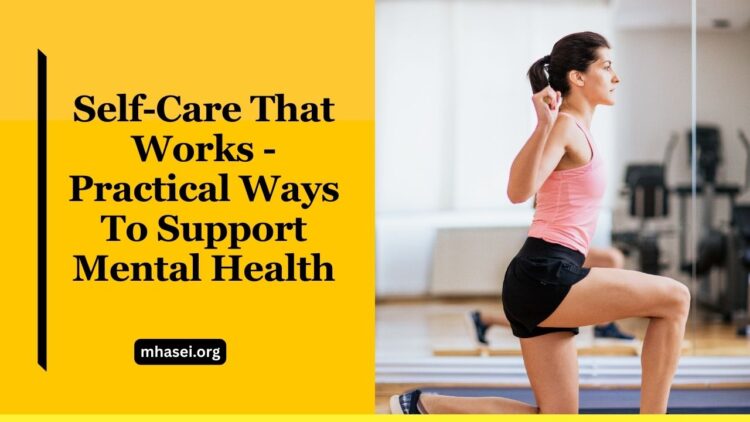In 2025, mental health remains a top global concern, with stress, anxiety, and depression affecting millions worldwide. The World Health Organization estimates that nearly 1 in 8 people live with a mental health condition, while workplace stress and social pressures continue to rise.
Fortunately, self-care practices—when applied consistently—can dramatically improve resilience, lower stress levels, and enhance overall well-being.
This article explores practical, science-backed ways to support mental health, along with the latest insights on what works best in daily life.
Why Self-Care Is Essential for Mental Health
Self-care isn’t about luxury or indulgence—it’s about maintaining balance in the face of stress. Regular self-care:
- Reduces anxiety and depression by regulating the body’s stress response.
- Improves sleep quality, which is vital since poor sleep is linked to worsening mental health.
- Strengthens emotional resilience, making it easier to cope with life’s challenges.
- Boosts productivity and focus, reducing burnout risks.
Studies consistently show that people who prioritize self-care are less likely to experience chronic stress and more likely to report higher life satisfaction.
Key Areas of Self-Care That Work
| Self-Care Category | Practical Actions | Benefits for Mental Health |
|---|---|---|
| Physical Self-Care | Regular exercise, balanced diet, proper hydration | Reduces stress hormones, improves mood |
| Emotional Self-Care | Journaling, mindfulness, therapy sessions | Encourages self-awareness and emotional release |
| Social Self-Care | Staying connected with family, friends, and support groups | Reduces loneliness, strengthens belonging |
| Spiritual Self-Care | Meditation, prayer, nature walks | Promotes calmness and purpose |
| Workplace Self-Care | Breaks, boundary setting, flexible schedules | Prevents burnout and increases focus |
| Digital Self-Care | Limiting screen time, digital detoxes | Reduces anxiety and improves sleep |
1. Exercise and Movement
Engaging in just 30 minutes of physical activity five times a week reduces symptoms of depression and anxiety. Whether it’s walking, yoga, or strength training, movement helps release endorphins—the body’s natural mood boosters. Even light stretching or desk exercises during work breaks can improve focus and reduce stress.
2. Nutrition and Hydration
Food has a direct impact on mood and energy. Diets rich in omega-3 fatty acids, whole grains, fruits, and vegetables are linked with better mental health outcomes. Conversely, excessive sugar, caffeine, and alcohol can worsen anxiety and disrupt sleep. Drinking 2–3 liters of water daily also supports brain function and emotional balance.
3. Sleep Hygiene
Adults need 7–9 hours of quality sleep per night. Lack of sleep is associated with higher risks of depression, irritability, and reduced cognitive performance. Practicing good sleep hygiene—such as avoiding screens before bed, keeping a consistent bedtime, and creating a calming environment—can drastically improve mental well-being.
4. Mindfulness and Relaxation
Mindfulness-based practices, such as meditation and breathing exercises, reduce stress and help regulate emotions. Studies show mindfulness can lower cortisol levels, enhance focus, and reduce symptoms of post-traumatic stress disorder (PTSD) and anxiety. Just 10 minutes of daily meditation can have measurable effects on mental health.
5. Social Connections
Humans thrive on connection. People with strong social networks are 50% more likely to live longer and report better emotional well-being.
Prioritizing regular catch-ups with friends, joining community groups, or even connecting online in healthy ways can combat loneliness and provide emotional support.
6. Setting Boundaries at Work
Burnout has become one of the most reported workplace issues. Setting limits on work hours, taking regular breaks, and learning to say “no” when overloaded are powerful self-care strategies. Employers offering flexible schedules and wellness programs also see increased productivity and lower turnover.
7. Digital Detox and Screen Balance
Excessive screen time, especially on social media, is linked with anxiety, poor sleep, and decreased self-esteem. Taking digital detox breaks, limiting scrolling, and setting screen-free times (like during meals or before bed) are essential steps toward better mental balance.
The Economic and Social Value of Self-Care
- Healthcare savings: Consistent self-care reduces the risk of chronic mental health issues, lowering medical costs.
- Workplace benefits: Employees who practice self-care report higher job satisfaction and fewer sick days.
- Societal gains: Communities that encourage wellness see reduced healthcare burdens and stronger social connections.
In 2025, as mental health challenges continue to rise, self-care that works is no longer optional—it’s essential. From exercise and balanced nutrition to mindfulness, social connections, and digital boundaries, these practical steps empower individuals to take control of their well-being. Small, consistent changes can dramatically improve mental resilience, reduce stress, and boost overall life satisfaction.
Supporting mental health begins with everyday choices—and self-care is the foundation of a healthier, more balanced future.
FAQs
How much time should I dedicate to self-care daily?
Even 15–30 minutes a day of intentional self-care activities can make a significant difference in mental well-being.
Can self-care replace therapy or medication?
No. While self-care is powerful, it complements—not replaces—professional treatment. For severe conditions, therapy and medication may still be necessary.
What is the most effective self-care practice?
There’s no one-size-fits-all. However, a combination of exercise, sleep, mindfulness, and social connection tends to deliver the strongest benefits.




